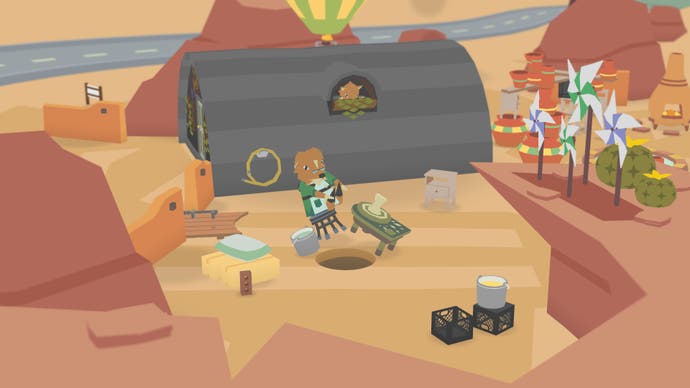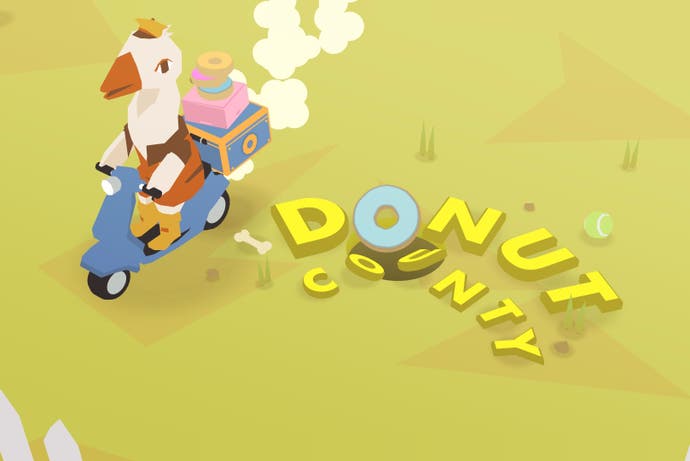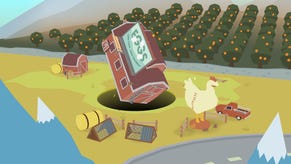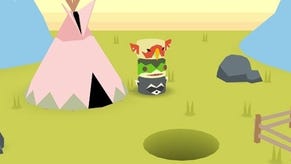Donut County might be the next great game about Los Angeles
The hole story.
Last year, Chris Donlan called the experimental interactive experience Islands: Non-Places the best game he'd played about LA. Given that he wrote the definitive article about games set in LA, I won't argue with him. That said, there's a new contender on the horizon with Ben Esposito's quirky puzzler Donut County.
The name is a bit of a misnomer, as Donut County isn't really about doughnuts. It is, however, about their most iconic characteristic: holes. What are they there for? And why? Is it to make them easier to grip as one dunks them into coffee? Is it to sell the holes as a separate entity? Or maybe someone just did it once and everyone else went along with the trend. It's the perfect sugary snack for a city that's full of contradictions and mysteries, a void that sucks everything into its omnipresent thrall.
That's where Donut County comes in. Esposito's game is about a mysterious hole that consumes everything in its wake. The more that falls into this perfectly round pit, the more it grows. It's a bit like Katamari Damacy in reverse, replacing the cosmic sticky ball of clutter with an ever-expanding circular gap into the ether.
But there's one mechanic that separates it from Keita Takahashi's cult classic: Donut County's hole doesn't just consume, it also creates. Objects can be mixed and used inside the chasm. Swallow something on fire, and the heat can be used to help a stranded civilian float off to safety in their hot air balloon.
Each of Donut County's 20 or so stages will be centred on a specific theme, be it spooking a ranger terrified of snakes or combining a landscape's water and vegetation to make soup. "It's more of a puzzle game than anything else," Esposito tells me on the PAX West showfloor where I play the game.
While the hole's origin remains a mystery, its master is revealed in the opening cutscene as an anthropomorphic raccoon named BK, who controls the strange cavity on his phone. Unbeknownst to him, the hole he's handling in his app is actually a real phenomena, though he doesn't seem overly concerned about that. He's more worried about fixing his model plane than the city he's swallowed.
Originally, the story was going to center on BK's best friend, Mira, accepting a job from nefarious raccoons who are hellbent on taking over the town by using this destructive hole to raze the property, but Esposito ultimately found that this didn't feel right.
"I didn't want to make a game where you do bad stuff and then I wag my finger at you at the end. Like 'didn't you realise that you were being the jerk?'" Esposito says. "So that's when I came up with the idea to flip it, so you start as BK and you know BK is a fool from the beginning. Everyone tells him 'We know what you did! You're an asshole!'"
"The game is about BK coming around and understanding the perspectives of all these different people," he explains of the new plot. "I think it feels more satisfying ultimately that you knew he was wrong and you helped him come to the conclusion that he should not have been systematically destroying and replacing everything in this town."

This adorable storybook plot is cute and charming, and family friendly to boot, but it's not Donut County's most thematically rich content. That comes back to its California setting, which will encompass areas from the Mojave Desert all the way to the heart of Los Angeles, where Esposito is currently based.
In fact, that's where Donut County gets its name. "The thing that struck me about LA the most was the doughnut shop culture," Esposito says. "When I moved there it was all mom and pop doughnut shops, and they all had their cultural take on it. So there was doughnuts and Chinese food! Or doughnuts and Croatian food! And I thought that was really cool because where I came from, it was all Dunkin' Donuts and that was it."
Unfortunately, as with much of LA, big business tends to crush the creative, independent spirit that the town is built on. "Dunkin' Donuts is coming back," Esposito laments. "They were in Southern California for awhile, but they stopped all shops there. And now they're coming back and I know how these things go. They're just going to take over everything. Everyone's going to close down."
It's a tragedy for doughnut connoisseurs and Californians alike, but Esposito doesn't seem especially grim about it, as a corporate doughnut takeover is hardly the worst catastrophe LA has suffered.
"LA has a history of earthquakes and sudden developments that kind of flip the landscape in pretty severe ways," Esposito explains. "For instance, downtown LA is really an incredibly weird place. Now basically no one lives there. And they're trying to convert it back into the city's heart. In the process of all those interruptions, like natural disasters and gentrification, it keeps pushing out certain communities of people and they keep having to populate different areas. So I find the history of LA really fascinating as it's this history of displacement and erasure and history rewriting itself. Those are all themes that I'm trying to touch on with this metaphorical hole."
While Doughnut County promises to be a pleasingly upbeat puzzler, it's the loosely real world setting that gives this curious adventure its most compelling character. Ultimately, Esposito says it best: "The game is about a place more than a hole, because a hole isn't anything."


















